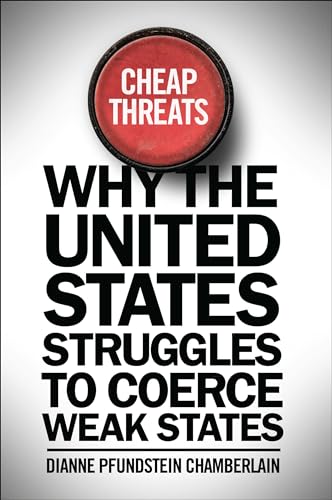Verwandte Artikel zu Cheap Threats: Why the United States Struggles to Coerce...

Zu dieser ISBN ist aktuell kein Angebot verfügbar.
Alle Exemplare der Ausgabe mit dieser ISBN anzeigen:
Críticas:
Students, scholars, and general readers should find the work useful, while policy makers should pay particular attention to the book's implications for diplomacy. --MCU Journal In this fascinating and carefully argued study, Pfundestein Chamberlain puts forward a "costly compellence theory." --Foreign Affairs
Reseña del editor:
Why do weak states resist threats of force from the United States, especially when history shows that this superpower carries out its ultimatums? Cheap Threats upends conventional notions of power politics and challenges assumptions about the use of compellent military threats in international politics. Drawing on an original dataset of US compellence from 1945 to 2007 and four in-depth case studies -- the Cuban Missile Crisis, the 2011 confrontation with Libya, and the 1991 and 2003 showdowns with Iraq -- Dianne Pfundstein Chamberlain finds that US compellent threats often fail because threatening and using force became comparatively "cheap" for the United States after the Cold War. Becoming the world's only superpower and adopting a new light-footprint model of war, which relied heavily on airpower and now drones, have reduced the political, economic, and human costs that US policymakers face when they go to war. Paradoxically, this lower-cost model of war has cheapened US threats and fails to signal to opponents that the United States is resolved to bear the high costs of a protracted conflict. The result: small states gamble, often unwisely, that the United States will move on to a new target before achieving its goals. Cheap Threats resets the bar for scholars and planners grappling with questions of state resolve, hegemonic stability, effective coercion, and other issues pertinent in this new era of US warfighting and diplomacy.
„Über diesen Titel“ kann sich auf eine andere Ausgabe dieses Titels beziehen.
- VerlagGeorgetown University Press
- Erscheinungsdatum2016
- ISBN 10 1626162816
- ISBN 13 9781626162815
- EinbandTapa blanda
- Anzahl der Seiten284
Neu kaufen
Mehr zu diesem Angebot erfahren
EUR 46,11
Versand:
EUR 48,99
Von Deutschland nach USA
Beste Suchergebnisse beim ZVAB
Cheap Threats
Verlag:
Georgetown University Press
(2016)
ISBN 10: 1626162816
ISBN 13: 9781626162815
Neu
Softcover
Anzahl: > 20
Anbieter:
Bewertung
Buchbeschreibung Zustand: New. Why do weak states frequently resist threats of force from the United States? In this book, the author argues that the United States model of inexpensive war making allows it to casually threaten force and carry out frequent short-term military campaigns. Artikel-Nr. 904586988
Weitere Informationen zu diesem Verkäufer | Verkäufer kontaktieren
Neu kaufen
EUR 46,11
Währung umrechnen

